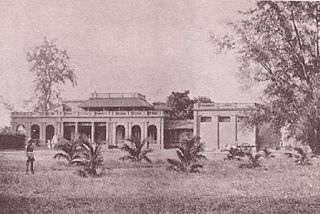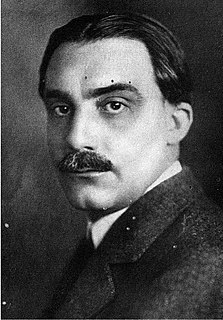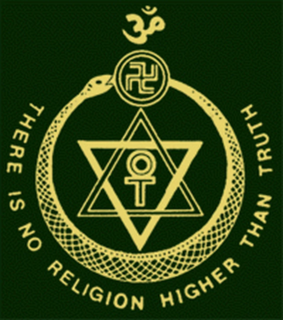Related Research Articles

The Theosophy Society was founded by Helena Petrovna Blavatsky and others in 1875. The designation 'Adyar' is sometimes added to the name to make it clear that this is the Theosophical Society headquartered there, after the American section and some other lodges separated from it in 1895, under William Quan Judge. In 1882, its headquarters moved with Blavatsky and president Henry Steel Olcott from New York to Adyar, an area of Chennai, India.

The Theosophical Society, founded in 1875, is a worldwide body with the aim to advance the ideas of Theosophy in continuation of previous Theosophists, especially the Greek and Alexandrian Neo-Platonic philosophers dating back to 3rd century CE. It also encompasses wider religious philosophies like Vedānta, Mahāyāna Buddhism, Qabbalah, and Sufism. The Theosophical Society functions as a bridge between East and West, emphasizing the commonality of human culture.

Annie Besant was a British socialist, theosophist, women's rights activist, writer, orator, educationist, and philanthropist. Regarded as a champion of human freedom, she was an ardent supporter of both Irish and Indian self-rule. She was a prolific author with over three hundred books and pamphlets to her credit. As an educationist, her contributions included being one of the founders of the Banaras Hindu University. For fifteen years Besant was a public proponent in England of atheism, scientific materialism. Besant's goal was to provide better employment, living conditions, and education for the poor.

The Theosophical Society (Pasadena) is a branch of Theosophy based in Pasadena, California. It claims to be the successor organization to the original Theosophical Society founded by Helena Petrovna Blavatsky and others in 1875 in New York City. Currently is the second largest Theosophical group in members and international reach after the Theosophical Society Adyar.

Bhagwan Das was an Indian Theosophist and public figure. For a time he served in the Central Legislative Assembly of British India. He became allied with the Hindustani Culture Society and was active in opposing rioting as a form of protest. As an advocate for national freedom from the British rule, he was often in danger of reprisals from the Colonial government. He was awarded the Bharat Ratna in 1955.

The Theosophical Society in America (TSA) is a member-based nonprofit organization dedicated to the teaching of Theosophy and affiliated with the international Theosophical Society based in Adyar, Chennai, India. The name "Theosophical Society in America" was legally adopted by the American Theosophical Society in 1934. Previously, other organizations had used the same name during the years 1895–98 and 1898–1908.

George Sydney Arundale was a Theosophist, Freemason, president of the Theosophical Society Adyar and A bishop of the Liberal Catholic Church. He was the husband of the Indian dancer Rukmini Devi Arundale.

Radha Burnier was born in Adyar, India. She was president of the Theosophical Society Adyar from 1980 until her death in 2013. She was General Secretary of the Indian Section of the Society between 1960 and 1978, and was previously an actress in Indian films and Jean Renoir's The River.

Curuppumullage Jinarajadasa was a Sri Lankan Sinhalese author, occultist, freemason and theosophist. The fourth president of the Theosophical Society, Jinarajadasa was one of the world's foremost Theosophical authors, having published more than 50 books and more than 1600 articles in periodicals during his life. His interests and writings included religion, philosophy, literature, art, science and occult chemistry. He was also a rare linguist, who had the ability to work in many European languages.
Bahman Pestonji Wadia or Bomanji Pestonji Wadia was an Indian theosophist and labour activist. He was first a member of the TS Adyar, later of the United Lodge of Theosophists. On 13 April 1918, along with V. Kalyanasundaram Mudaliar, Wadia founded the Madras Labour Union, one of India's first organised labour unions.

The Theosophical Society in America was an organization that developed from the Theosophical Society in America.

Theosophical teachings have borrowed some concepts and terms from Buddhism. Some theosophists like Helena Blavatsky, Helena Roerich and Henry Steel Olcott also became Buddhists. Henry Steel Olcott helped shape the design of the Buddhist flag. Tibetan Buddhism was popularised in the West at first mainly by Theosophists including Evans-Wentz and Alexandra David-Neel.
Daniel Nicol Dunlop was a Scottish entrepreneur, founder of the World Power Conference and other associations, and a theosophist-turned-anthroposophist. He was the father of artist Ronald Ossory Dunlop.
The Blavatsky Lodge was an English Theosophical Society. The complete name is The Blavatsky Lodge of the Theosophical Society.
The Order of the Star in the East (OSE) was an international organisation based at Benares (Varanasi), India, from 1911 to 1927. It was established by the leadership of the Theosophical Society at Adyar, Madras (Chennai), in order to prepare the world for the arrival of a reputed messianic entity, the World Teacher or Maitreya. The OSE acquired members worldwide as it expanded in many countries; a third of its diverse membership c. 1926 was unaffiliated with the Theosophical Society. The precursor of the OSE was the Order of the Rising Sun and the successor was the Order of the Star. The precursor organisation was formed after leading Theosophists discovered a likely candidate for the new messiah in the then–adolescent Jiddu Krishnamurti (1895–1986), a South Indian Brahmin who was installed as Head of the Order. Almost two decades later Krishnamurti rejected the messianic role, repudiated the Order's mission, and in 1929 disbanded the OSE's successor. The founding and activities of these organisations, as well as the largely unexpected dissolution of the OSE's successor, attracted widespread media attention and public interest. They also led to crises in the Theosophical Society and to schisms in Theosophy.

Theosophy in Scandinavia is represented by many independent lodges.

The Theosophical Society in the Philippines is a branch of the Theosophical Society Adyar with headquarters in Chennai, India.

In Theosophy, Maitreya or Lord Maitreya is an advanced spiritual entity and high-ranking member of a reputed hidden spiritual hierarchy, the Masters of the Ancient Wisdom. According to Theosophical doctrine, one of the hierarchy's functions is to oversee the evolution of humankind; in concert with this function Maitreya is said to hold the "Office of the World Teacher". Theosophical texts posit that the purpose of this Office is to facilitate the transfer of knowledge about the true constitution and workings of Existence to humankind. Humanity is thereby assisted on its presumed cyclical, but ever progressive, evolutionary path. Reputedly, one way the knowledge transfer is accomplished is by Maitreya occasionally manifesting or incarnating in the physical realm; the manifested entity then assumes the role of World Teacher of Humankind.

Theosophy is a religion established in the United States during the late 19th century. It was founded primarily by the Russian immigrant Helena Blavatsky and draws its teachings predominantly from Blavatsky's writings. Categorized by scholars of religion as both a new religious movement and as part of the occultist stream of Western esotericism, it draws upon both older European philosophies such as Neoplatonism and Asian religions such as Hinduism and Buddhism.

Hinduism is regarded by modern Theosophy as one of the main sources of "esoteric wisdom" of the East. The Theosophical Society was created in a hope that Asian philosophical-religious ideas "could be integrated into a grand religious synthesis." Prof. Antoine Faivre wrote that "by its content and its inspiration" the Theosophical Society is greatly dependent on Eastern traditions, "especially Hindu; in this, it well reflects the cultural climate in which it was born." A Russian Indologist Alexander Senkevich noted that the concept of Helena Blavatsky's Theosophy was based on Hinduism. According to Encyclopedia of Hinduism, "Theosophy is basically a Western esoteric teaching, but it resonated with Hinduism at a variety of points."
References
- ↑ Theosophy at The Canadian Encyclopedia, accessed September 2, 2019
- 1 2 3 The high country Theosophist, September 1992
- 1 2 The high country Theosophist, March 1996